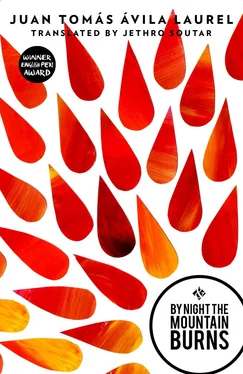Juan Ávila Laurel - By Night the Mountain Burns
Здесь есть возможность читать онлайн «Juan Ávila Laurel - By Night the Mountain Burns» весь текст электронной книги совершенно бесплатно (целиком полную версию без сокращений). В некоторых случаях можно слушать аудио, скачать через торрент в формате fb2 и присутствует краткое содержание. Год выпуска: 2014, Издательство: And Other Stories Publishing, Жанр: Современная проза, на английском языке. Описание произведения, (предисловие) а так же отзывы посетителей доступны на портале библиотеки ЛибКат.
- Название:By Night the Mountain Burns
- Автор:
- Издательство:And Other Stories Publishing
- Жанр:
- Год:2014
- ISBN:нет данных
- Рейтинг книги:5 / 5. Голосов: 1
-
Избранное:Добавить в избранное
- Отзывы:
-
Ваша оценка:
- 100
- 1
- 2
- 3
- 4
- 5
By Night the Mountain Burns: краткое содержание, описание и аннотация
Предлагаем к чтению аннотацию, описание, краткое содержание или предисловие (зависит от того, что написал сам автор книги «By Night the Mountain Burns»). Если вы не нашли необходимую информацию о книге — напишите в комментариях, мы постараемся отыскать её.
By Night the Mountain Burns — читать онлайн бесплатно полную книгу (весь текст) целиком
Ниже представлен текст книги, разбитый по страницам. Система сохранения места последней прочитанной страницы, позволяет с удобством читать онлайн бесплатно книгу «By Night the Mountain Burns», без необходимости каждый раз заново искать на чём Вы остановились. Поставьте закладку, и сможете в любой момент перейти на страницу, на которой закончили чтение.
Интервал:
Закладка:
The men who died in that pursuit of the light were Sambachita Ánkene, who I think was the tallest man on the island, Ze Gutín Pêndê, Fidel Gañía, Pudul Jodán, Ze Fingui, Zancus’u Gueg’a, Ze Jandjía Teix, Menembofi Sugalía and that man who everyone knew would not be going to the Señor ’s paradise, because he said such awful things about Jesucristo and the Virgen . And once again, Sabina’s premonitions had come true. For she had said she’d been met by many soaking men who smelled of saltwater, and she’d seen a face among the men that had been so familiar she hadn’t been able to keep quiet about who it was, and so she’d told everyone that something bad was going to happen and that it would involve that man who was not going to be granted salvation, that something bad was going to happen at sea, and that was why those men looked soaking wet and smelled of saltwater, at least to Sabina’s eyes and nose. But nobody had listened to her, maybe because nobody was willing to accept that yet another catastrophe was going to befall the island. And in fact that had a lot to do with why Sabina went around crying; she didn’t want to be the bearer of bad news, to have to tell people that more misfortune lay ahead. But there was no escaping it. When I got older and started to listen to adult conversations, the deads would make me very angry. Up until then, I’d understood that deads could help alives avoid catastrophes. But once these things came out of Sabina’s mouth, or out of the mouths of any of the other clairvoyants, the catastrophes happened without anybody being able to do anything about them. I said to myself: What’s the point of the deads? I thought they were meant to protect us? I found it hard to believe that they were so powerful they could bother Sabina by telling her a catastrophe was going to happen, but they couldn’t do anything to prevent the catastrophe from happening. I thought of all this because it was what I heard the old people say, and they knew the most about everything.
The whole island cried a lot, a tremendous amount. They were eight men with wives and children, families who’d start to have it bad now that the man of the house was gone. To have it bad even in the context of the hardship we had anyway. The whole island cried a lot and for several days. It was said, based on what the sole survivor said, once he could finally speak, that the light they saw on the horizon wasn’t real, that it had been a trick. That’s to say, a light that led them to their deaths. It led them far out to sea and, when they were so far out they could no longer see the island, the light disappeared, as if it had never shone in the first place. They realised they’d been tricked, but there was nothing they could do other than go on paddling; from then on, and until midday the next day, they paddled non-stop, searching for the lost island. That’s why I said I could say it a hundred times and still not come close to describing how much they paddled. They paddled, and paddled, and paddled, and paddled, and paddled, and paddled, and paddled, and paddled, and paddled, and paddled, until they could paddle no more. And that’s when they saw land with mountains and trees. But it wasn’t real. There were trees and mountains that they could see right before their eyes, as if they could reach out and touch them with their hands, but when they rubbed their eyes to look closer, the mountains and trees were gone, and all they saw were the four points of the horizon again. They hadn’t eaten since leaving the village of San Xuan, and they’d taken nothing to drink with them either, for they had set off thinking that on that boat, from whatever nation it was, they’d be given food and drink, even that they’d smoke. But it didn’t turn out like that.
One thing I know, for I’ve heard it said by adults many times, is that the last thing a lost canoeman does is stop paddling. When he lays his paddle down in his canoe, it’s because he’s handing his life over to destiny. Even if there’s no land in sight, you paddle until your last breath. What I also know, or think, is that not even the adults who went out in canoes knew how many countries there were close to our island, nor how near to us any of them were. So doubtless they did paddle until their last breath, but without knowing which direction to go in, until they were swept up by a current, and nobody can escape from a current, you just have to wait until it lets you be and deposits you wherever. The phenomenon of being swept up by currents has a fearsome name in my language. It only occurs way out at sea, in waters that know nothing of our Atlantic Ocean island. If any of those canoes ended up in one of those currents, they were doubtless taken to die somewhere very far from our island, somewhere no one returns from. They disappeared. We cried a lot, but they were never heard of again, except for one of them, who told the story of having been to the other side. The others were never heard of again. They disappeared from our lives.
That was the terrible case of the men who got lost at sea. But I was talking about the young canoeman who left a woman on the shore of the big village and then she disappeared from sight. So what happened to her? The man knew she was in a hurry because her child was sick, but even so, she couldn’t have got up the beach in such a short time. Something had happened to her. The man became worried and set off to investigate, to find out what had happened to the woman with the sick child in her arms. And what had happened was this. On our island, children go to the sandy beach of the big village during the day. They go there because the sand is fine and fun to play in. And part of the fun, or the play, consists of digging big holes in the sand with your hands, climbing into the hole and hiding from other children. The adults know about this game and make sure the children fill in the holes before leaving the beach. But sometimes night might start spreading its dark cloak over the island and the children, hiding in their holes or running from one hole to another, are having too much fun to notice. Then their mothers appear to tell them it’s time to leave the beach and come home. And in their haste, brought on by the impending gloom and their mothers’ anxious calls, the children leave the holes they’ve dug and run home. Most children run home without even brushing the sand off themselves, never mind filling the holes in. And because most children are afraid of going near the water at night, they go to bed with sand all over their bodies, feet and face. Gracias a Dios , sand doesn’t stain or irritate the skin. I know this from experience. And considering how deeply we slept, a few grains of sand in the sheets obviously didn’t bother us. Just think: even with a bed full of sand we slept so deeply we wet the bed without realising it.
Anyway, what’s significant about all this is that holes are left without being filled in, and anyone walking on the beach in the dark, like that woman with the sick child, could easily fall into one and hurt themselves. And that’s exactly what happened when the man laid down his paddle after travelling many hours from the south village. The woman fell into one of those holes and disappeared from the canoeman’s sight. And as he knew nobody on the island had ever disappeared before, the man became worried, became alarmed even, and so he took a few steps forward, for he’d have a story to tell the next day. If you were with someone and they disappeared, you’d be the first person on the island to tell of someone having the ability to disappear. And if that someone was a woman, she might be a she-devil. So you had to be alert. He went to see what had happened to the woman and, after taking a few steps, he saw what it was. It was night and the whole island was in darkness. The woman had stepped forward, met with no ground and been swallowed up by the hole. Furthermore, she’d toppled forward and landed face-first against the side of the hole, and sand had got up her nose and into her mouth. And because she didn’t know where she was stepping, and then stepped on nothing, the impact when her foot hit the bottom of the hole had jolted through her leg and sprained her ankle. The woman wasn’t expecting to come across a hole in the middle of the night, and when you put your weight down on something that ends up being nothing, you tend to get injured. That’s how the man found her. Her face ached from banging into the side of the hole, she’d swallowed a mouthful of sand and her ankle hurt from the jolt it got when her foot hit the bottom of the hole. The injury to her ankle caused her more pain than her nose and mouth. She could no longer walk. And what about the child she’d had in her arms? The child had come loose as she fell and landed a few feet away from the hole, still wrapped in cloth.
Читать дальшеИнтервал:
Закладка:
Похожие книги на «By Night the Mountain Burns»
Представляем Вашему вниманию похожие книги на «By Night the Mountain Burns» списком для выбора. Мы отобрали схожую по названию и смыслу литературу в надежде предоставить читателям больше вариантов отыскать новые, интересные, ещё непрочитанные произведения.
Обсуждение, отзывы о книге «By Night the Mountain Burns» и просто собственные мнения читателей. Оставьте ваши комментарии, напишите, что Вы думаете о произведении, его смысле или главных героях. Укажите что конкретно понравилось, а что нет, и почему Вы так считаете.












